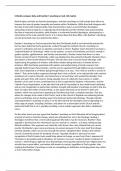Critically compare Daly and Ruether’s teaching on God. [40 marks]
Both Ruether and Daly are feminist theologians, and their teachings on God include their efforts to
improve the issue of gender inequality and sexism within Christianity. While they both disagree with
the idea of God with predominantly male characteristics, Daly is a post-Christian theologian,
advocating controversially for an abandoning of Christianity and the Christian God and promoting
the idea of matriarchal societies, while Ruether is a reformist feminist theologian, advocating for a
reformation of the male centred Church. It is in these ideas that they differ, with Ruether’s teachings
on God presented more successively than Daly’s.
Ruether’s teachings on God surround the idea that Christianity itself is not intrinsically patriarchal,
but has been distorted by the patriarchy, evident through the Catholic Church’s teachings on
women’s ordination and view on abortion and needs a reform. Ruether claims that there has been a
“patriarchization of Christology” which can be undone, as much of Christianity and God is rooted in
gender equality, egalitarianism, and female characteristics. Ruether claims that there is a clear
female concept of God in Christianity, which was displaced by the patriarchal Davidic Messiah, this is
also known as the Female Wisdom Principle. This idea has roots in ancient Greek theology, with
Sophia being the goddess of wisdom, with divine wisdom being referred to in female terms in
Scripture. With God being associated with wisdom and wisdom being a female concept, God
arguably holds female characteristics, and this can be supported through biblical verses including in
Isiah, God is depicted as a Mother going through labour as it says, “now I will cry out like a woman in
labour”. This can be further supported through Jesus’ time on Earth, as he rejected the male-centred
prophecies of a warrior Messiah, and instead was a ‘servant King’ who washed his disciples’ feet,
spoke and spent time with women, being arguably more of a liberator than warrior or soldier.
Ruether can be seen as very convincing here as she is supported by Quakers, Mennonites, and the
Catholic Peace Organisation, in the idea that God and his incarnation of Jesus hold female attributes
and are not misogynistic or patriarchal. Another strength with Ruether’s teachings on God is that she
does not reject the notion of God entirely, as she argues that God can be known in spirit and
wisdom, which may sound more appealing to Christians than Daly’s complete rejection. This also
allows for changes to be made in the Church, such as the Church of England now ordaining female
priests and bishops and are backing away from dominant patriarchal ideology. Through critically
assessing Ruether’s teachings on God, it can be inferred that her ideologies may be appealing to a
wide range of people, including Christians, and allows for a reformation of the Church and the
patriarchal hold that is on it, possibly providing a more realistic approach than Daly’s abolitionist
views.
On the other hand, one may argue that Ruether’s teachings on God ultimately fail at bringing about
any kind of social or feminist change, which was ultimately her aim in her theology, leading a
theologian to believe that a more radical approach like Daly’s may be necessary. Ruether’s flaw
arguably is derived from her referring to God as a woman or ‘mother’, as it does nothing except
disturb traditions. This argument was raised by critic Simon Chan, who claimed that one cannot
rewrite Christianity to give more prominence to women because it is the story itself that shapes
Christian identity, which can be seen through the phrase ‘almighty Father’ being in the Catholic
Church’s Eucharistic prayer for hundreds of years. Arguably, Ruether’s advocacy for more
recognition of God’s female traits would bring about no change, as seen from Chan’s argument of
“Devotion to the goddess Kali in Hinduism, for instance, has never resulted in better treatment of
women”, which brings to light the issue that perhaps removing the patriarchy from religion does not
actually have a great effect, and sexism still remains in society, regardless of God’s gender, thus
implying that Ruether’s teachings on God are compelling yet ineffective at bringing about any radical
or even reformative change.





